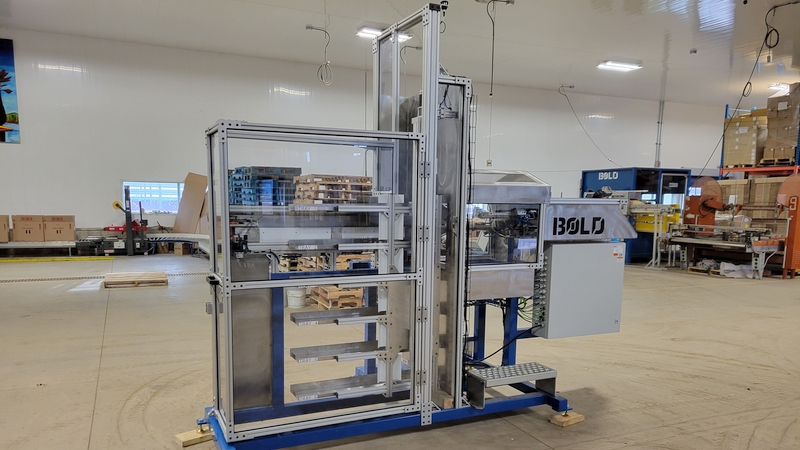Peace Of A Puzzle

It was a strange thing…” So begins Lloyd Traven’s explanation of exactly how he embarked down the path of merging his Kintersville, Pa.-based Peace Tree Farms with Dave Eastburn’s Chalfont, Pa.-based Gro ‘n Sell. Traven and Eastburn had known each other for 30 years, and being only 20 miles apart, they had even done some business together over the years. Each was wrapped up in the day-to-day needs of their growing businesses while thinking daily about plans for future expansion.
Two Growers Walk Into A Bar…
For his part, Traven was busy designing and building his new greenhouse facility when one day, a visitor stopped by. “More than two full years ago, Dave Eastburn’s partner and manager, Dave Newberry, the logistics guy at Gro ‘n Sell, stopped by to see what we were up to,” recalls Traven. “Dave Eastburn was literally out of the country, in Siberia, at the time!
“So we’re standing around, kicking clods of mud on the site, and I mention the fact that I wish that I had more greenhouse space in April so that I’d have stuff for May. Dave (Newberry) says that they’re pretty much done by the first of April, and have several acres of beautiful greenhouse sitting empty. Then he mentions offhand that they really start to need space mid-December through late February, and I’m thinking ‘Hey, I’m pretty empty around that time of year.’ We started joking about going into business together.”
The more the “joke” was passed back and forth, the less humorous and more sensible the idea became, says Traven. “They have the schedules, techniques and regulations down to a science. I’m really good at product flow, cost analysis and marketing. They’re really strong in organization and logistics, and know exactly what their inventory is at any moment, but they don’t like to sell, whereas I love to sell things. The more we thought about it, the more we realized that our strengths fit really well together.” When Eastburn returned, the two owners started talking about the idea, and the pros added up.
“Labor-wise, it’s a home run,” Traven explains. “Infrastructure-wise, it’s a huge home run. At Peace Tree, we’ve already made the investment in a production line that can handle four to five times the greenhouse space we have. For ramping up propagation, they have a world-class, state-of-the-art seeding line. All of these parts are already owned by us, so together we’d ultimately just need to invest in more greenhouse facilities, which each of us would need to do no matter what!” Their sales objectives and customer bases were also complementary, notes Traven.
“Both of our contacts are great, and we sell to different brokers. I sell finished, which gives Gro ‘n Sell a whole new outlet and keeps them busy far longer into the year. On the other hand, they’re keeping us busy when we’re slow.
Unlimited Refills
A thorough assessment of the resources the two companies could pool together revealed even more potential for bottom line profits. “We’ve got two great propagation ranges, and now we’ve got two great finishing ranges,” Traven says. “In fact, they (Gro ‘n Sell) didn’t even know what they had because they didn’t actively do sales. They deal with brokers, so they were taking orders instead of soliciting them.” Traven proposed production scheduling that should run like clockwork, allowing more turns in a longer growing window.
“Their propagation runs out of steam in the beginning of April, and they turn their space over to landscape contractors for 1801 annuals production. Although it was a big contract, Gro ‘n Sell was only doing one shot of those in about ten days, and then they were empty. I showed them that if we start taking space in their perennial area in the beginning of March and start filling it up with Supertunias and calibrachoas, stuff that’ll really take it cold, by April 15th or so we can have that sold.
“Then we refill this space, and in your warm houses you start doing New Guineas, argyranthemums, ‘Diamond Frost,’ and other warmer stuff, and by early May we’ve sold all that. By Memorial Day, we’ve got still another turn. Instead of flats of 85-cent annuals, I’m showing them how we can use their greenhouse space together to get three rotations of something that sells for $2.20 at a much higher margin. It’s like a light went off in both our heads at once.”
Prenuptial Agreements
To hybridize a plant, one relies on a plant breeder. To hybridize two businesses, one relies on a business consultant. In order to get an objective opinion on their plans and to exercise due diligence should they go forward, Traven and Eastburn asked Bill McCurry from noted horticultural consulting firm McCurry & Associates to discuss the project, but from an unusual approach.
“It was a unique situation for Bill (McCurry), because he typically works for one side or the other and not for both companies,” Traven explains. After visiting each site on consecutive days, McCurry gathered the principals together to work out a list of pros and cons for this project. “We went around the room and everyone would give a reason to go through with it, and then we did the same thing with the negatives,” Traven recalls. “The final list was overwhelmingly positive to move forward.” At that point, McCurry pointed out that the potential need for an intermediary to coordinate things between these two hands-on owners and their companies — an argument that Traven agrees with.
“We need to establish the vision and the process, then allow these wonderful people around us to do their jobs. Both Dave and I do what I call MBWA — management by walking around. We needed to get someone else to be accountable, who could take our shared vision and make it happen.”
The formal business was next: business valuation, financials, stock ownership, buyouts, succession planning and the like. Each party brought different experiences and goals to the table. “For instance, for Candy and me, a major portion of this is an exit strategy, but Dave’s son is going for an MBA and wants to get into the business. We’ve figured out a thousand details, and now there’s a thousand more to do.”
The Legwork
In order to escape the MBWA rut, Traven and Eastburn have enacted a system of delegating responsibility and established a quick decision-making formula to work in that system. Each area of responsibility has a task-team (the finish production team, propagation team, perennial team, technology team, facility team and marketing team are just a few) that will evaluate concepts given to them by an executive committee. Traven explains further: “For instance, I’ll be in charge of the marketing team, but it will also have the broker contact, the person responsible for tags, et cetera. Dave and I will make the contact or concept, turn it over to whatever team is responsible for that subject area, and they evaluate it and report back with their findings. While it may sound like a lot of meetings, you’ve only got a couple people doing the legwork and then a quick yea or nay at the end, so it should be a fairly efficient way of merging two distinct businesses into one.”
Size Wise
Just by the very nature of such a merger, this new business will double the size of each entity immediately. However, Traven is counting on a gestalt effect, wherein the union is greater than simply combining the two parts together. “We have no intention or expectation of staying the size we are right now. We’ve got to grow. Right now, we’ve got space that sits idle for too long, so we’ve got to maximize what we already own first before we make any capital investments. But we’re definitely intending to keep building.”
Traven notes that both companies have had to turn business away for years due to insufficient size for production. “At Peace Tree, we didn’t have the greenhouse space we needed when we needed it. Dave has been turning down orders for years because he’s had no room to expand. All the hoops of buying land and building new greenhouses were driving him nuts!”
And so it all comes back to the land, says Traven. “Here, we’ve already got the room to expand, which is the reason that Dave Newberry stopped by our place a couple years ago.” Although he knows that his new company isn’t going to conquer the world from their corner of eastern Pennsylvania, Traven is pretty confident that he and Eastburn are going to keep doing what they do best.
“We’re still going to be a small company, but we’re going to become a much better small company.”









